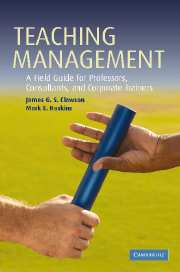Book contents
- Frontmatter
- Contents
- List of figures
- Sources to chapter quotations
- Why this book on teaching management?
- 1 Fundamental elements in teaching
- 2 Levels of learning: one, two, and three
- 3 Adult learning theory: it matters
- 4 Planning a course: trips and tips
- 5 Planning a class: no detail is too small
- 6 Lecturing: the possibilities and the perils
- 7 Managing discussions
- 8 Case method: fostering multidimensional learning
- 9 Role-playing
- 10 Case writing: crafting a vehicle of interest and impact
- 11 Case teaching notes: getting from here to there
- 12 Action learning
- 13 Experiential methods
- 14 Enhancing the conversation: audiovisual tools and techniques
- 15 Executive education: contributing to organizational competitive advantage
- 16 Using technology to teach management
- 17 Counseling students
- 18 Evaluating students: the twin tasks of certification and development
- 19 Teaching evaluations: feedback that can help and hurt
- 20 Research presentations
- 21 Managing a degree program: behind the ‘glory’
- 22 Managing a nondegree client program: an overview
- 23 Dealing with the press
- 24 Managing yourself and your time
- 25 Using teaching portfolios and course portfolios
- 26 Conclusion: is this on the exam?
- Index
3 - Adult learning theory: it matters
Published online by Cambridge University Press: 25 February 2010
- Frontmatter
- Contents
- List of figures
- Sources to chapter quotations
- Why this book on teaching management?
- 1 Fundamental elements in teaching
- 2 Levels of learning: one, two, and three
- 3 Adult learning theory: it matters
- 4 Planning a course: trips and tips
- 5 Planning a class: no detail is too small
- 6 Lecturing: the possibilities and the perils
- 7 Managing discussions
- 8 Case method: fostering multidimensional learning
- 9 Role-playing
- 10 Case writing: crafting a vehicle of interest and impact
- 11 Case teaching notes: getting from here to there
- 12 Action learning
- 13 Experiential methods
- 14 Enhancing the conversation: audiovisual tools and techniques
- 15 Executive education: contributing to organizational competitive advantage
- 16 Using technology to teach management
- 17 Counseling students
- 18 Evaluating students: the twin tasks of certification and development
- 19 Teaching evaluations: feedback that can help and hurt
- 20 Research presentations
- 21 Managing a degree program: behind the ‘glory’
- 22 Managing a nondegree client program: an overview
- 23 Dealing with the press
- 24 Managing yourself and your time
- 25 Using teaching portfolios and course portfolios
- 26 Conclusion: is this on the exam?
- Index
Summary
Every act of conscious learning requires the willingness to suffer an injury to one's self-esteem. That is why young children, before they are aware of their own self-importance, learn so easily.
– Thomas SzaszNothing ever becomes real till it is experienced.
– John KeatsIf teaching is about helping others learn, then we as teachers ought to understand the learning process of adults – people who, like us, have spent many years in schools, many years in society, and in some cases, many years working in business.
Adults don't learn like children. Adults are more discerning in what they are willing to learn, more questioning, and more resentful of being told what to learn. They need to see more clearly how what they are being asked to learn will benefit them; for adults, learning is much more utilitarian than it is for children.
Whether for children or adults, learning theories abound. We could consider the theories of Thorndike, Pavlov, Guthrie, Tolman, Hull, Skinner, the Gestalt theorists, Piaget, Freud, Knox, Knowles, Kolb, Bruner, and others. An exhaustive treatment of them, however, would consume this book and more. A variety of good books summarizes these theories; references for some of them are given at the end of this chapter. What we want to do here is to outline the chief characteristics of some practical models of adult learning that can provide a basis for discussion and inform your preparations for teaching.
- Type
- Chapter
- Information
- Teaching ManagementA Field Guide for Professors, Consultants, and Corporate Trainers, pp. 34 - 48Publisher: Cambridge University PressPrint publication year: 2006
- 4
- Cited by



